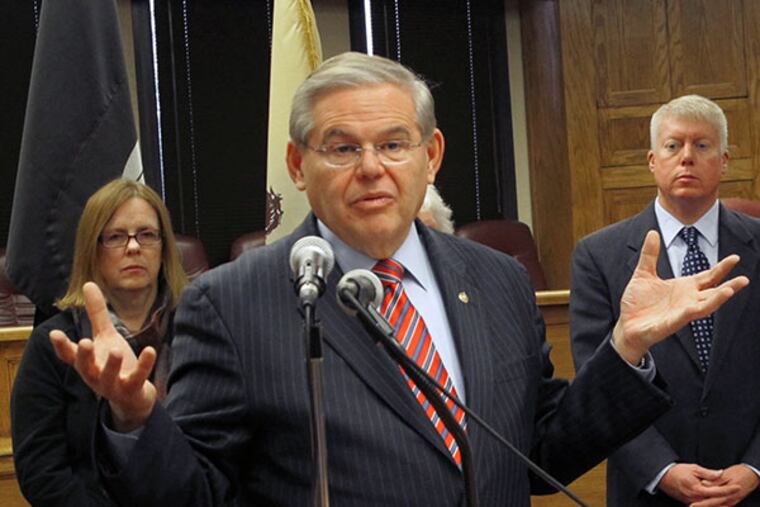Menendez pushes for delay in flood insurance hikes
BRICK, N.J. - Peggy Molloy had no damage to her house from Hurricane Sandy, but the red-haired, 56-year-old mother of two teenagers is facing a surge that could still put her under water.

BRICK, N.J. - Peggy Molloy had no damage to her house from Hurricane Sandy, but the red-haired, 56-year-old mother of two teenagers is facing a surge that could still put her under water.
An impending steep hike in National Flood Insurance Program rates would increase rates on her modest Point Pleasant rancher from $800 a year to between $10,000 and $14,000, she said, unless she spends about $80,000 to elevate the house.
"It has made my house worthless," she said. "My entire neighborhood is faced with this, but nobody believes it."
Molloy appeared Thursday at a news conference at which U.S. Sen. Robert Menendez (D., N.J.) urged Congress to pass legislation that would freeze the hikes for most homeowners.
Menendez wants the increases to wait until FEMA completes an affordability study - which could take up to three years - and scientifically certifies the new FEMA Flood Insurance Rate Maps that set the stage for dramatic hikes in flood-prone areas nationwide.
"This is not about some esoteric public policy argument," Menendez said. "This has real consequences to real lives."
He called the impending rate hikes "a ticking time bomb" for homeowners.
"Even as they recover from the worst natural disaster in our state's history, they are being faced with a man-made disaster in the form of skyrocketing flood insurance premiums," Menendez said.
"People come to me in tears, saying 'I'm going to lose my home,' " he said. "These are hardworking, middle-class families who played by the rules."
The hikes are part of the Biggert-Waters Act, which Congress passed in 2012 after claims from Hurricane Katrina put the insurance program on the verge of insolvency.
Congress reauthorized the program but mandated that it become self-sustaining. Menendez and other legislators, including U.S. Rep. Frank LoBiondo (R., N.J.), have been warning of its impact and urging delays, phase-ins, and, now, a freeze.
Menendez said the legislation would target only primary-home owners, adding that he sympathized with those who "worked a lifetime to get a bungalow" but said there was no political support for aid to second-home owners.
Businesses are also exempt from the legislation, as are properties that have suffered severe repetitive flood damage or were considered "substantially damaged" by the storm.
Homes in that last category already are required to rebuild to new flood-map elevation requirements, which would then qualify the homeowner for lower insurance rates.
The exemptions are designed "to minimize the impact on the solvency" of the insurance program, a goal that Menendez said his legislation also would further by preventing a wave of "cash-strapped homeowners dropping out of the program" because of the rate hikes.
Menendez's legislation, known as the Homeowner's Flood Insurance Affordability Act, was first introduced on the anniversary of the storm, then reintroduced. He said Thursday that he hoped it would come to a vote this month. It has 28 cosponsors in the Senate, eight of them Republicans.
Following Hurricane Sandy, FEMA released early drafts of its new flood maps for the most affected areas. After widespread criticism and alarm, much of the areas that had been moved into the "V," or velocity, zones were put back into zones with fewer requirements for elevation.
But in neighborhoods like Molloy's, the new flood maps are only now being released, and residents who survived the storm mostly intact are finding that their homes are out of compliance - in Molloy's case, by three feet in the elevation required by the new base maps. Their access to FEMA aid is limited.
Newly sworn-in Mayor John Ducey said the uncertainty had delayed recovery in Brick, where 8,000 homes were damaged. "People are afraid to rebuild because they might be totally priced out of their homes," Ducey said. "This is going to change the nature of our towns. People have had these homes for generations."
Ron Jampel, who formed a homeowner advocacy group called Save Our Community, said that the victims are not wealthy Shore-home owners. "These are not millionaire issues, as some wish to portray our dire situation," he said.
Menendez also said he would seek an expanded role for the federal government in expediting its Sandy aid through the state pipeline to victims.
Gov. Christie has complained that complex federal requirements have slowed the disbursement of aid to homeowners, but Menendez said he wants federal regulators "to require more from the state in terms of its processes."
A second round of Community Development Block Grants, worth $1.46 billion, is due to be sent to New Jersey in March.